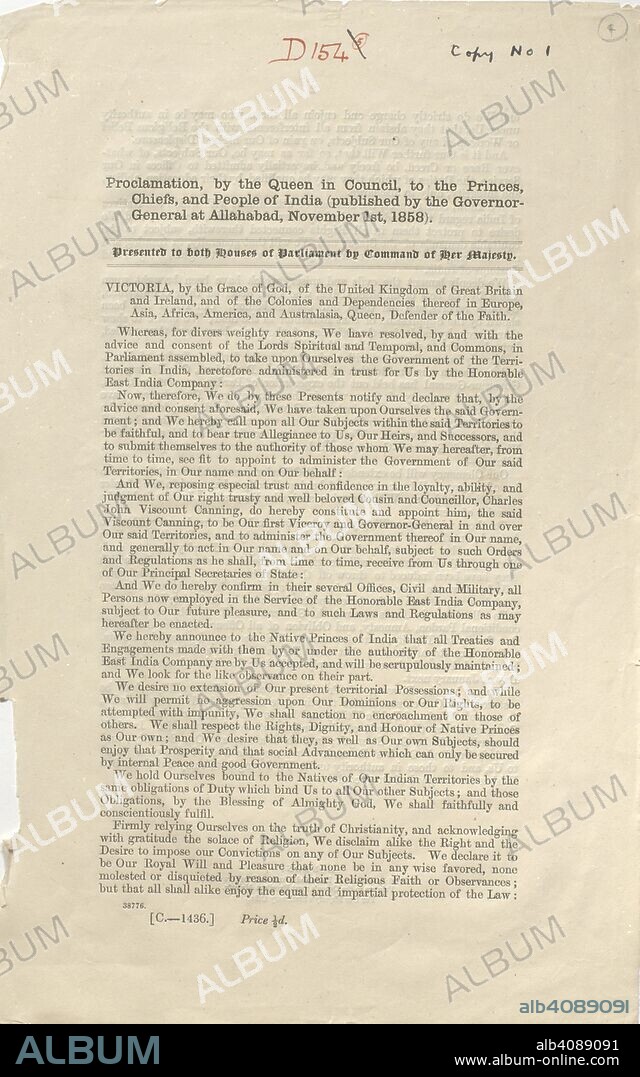alb4089091
Proclamation by the Queen to the People of India. In the aftermath of the Indian Rebellion (1857–58), the British Parliament passed the Government of India Act, transferring the rights and administrative authority of the East India Company to the British Crown. These governmental changes were announced to the ‘Princes, Chiefs and People of India’ in the form of this proclamation issued by Queen Victoria (r. 1837–1901). Seeking to maintain peace after the Rebellion, the whole tenor of the Proclamation was one of generosity and benevolence. It granted ‘the Natives of Our Indian Territories’ the same rights as ‘all Our other Subjects’ and, among other things, promised to support religious toleration, to recognise the ‘Customs of India’, to end racial discrimination and to ensure that ‘all shall alike enjoy the equal impartial protection of the Law’. By recognising Indians as British subjects, and extending to them rights consistent with that status, the Proclamation was widely heralded by Indian subjects, including Mohandas Gandhi (d. 1948), as their Magna Carta. Proclamation, by the Queen in Council, to the Princes, Chiefs, and People of India. Published by the Governor-General at Allahabad, November 1st, 1858 (London: Her Majesty’s Stationery Office, 1858). Source: IOR/L/PS/18/D154 copy no.1.

|
Añadir a otro lightbox |
|
Añadir a otro lightbox |



¿Ya tienes cuenta? Iniciar sesión
¿No tienes cuenta? Regístrate
Compra esta imagen
Descripción:
Ver traducción automática
Proclamation by the Queen to the People of India. In the aftermath of the Indian Rebellion (1857–58), the British Parliament passed the Government of India Act, transferring the rights and administrative authority of the East India Company to the British Crown. These governmental changes were announced to the ‘Princes, Chiefs and People of India’ in the form of this proclamation issued by Queen Victoria (r. 1837–1901). Seeking to maintain peace after the Rebellion, the whole tenor of the Proclamation was one of generosity and benevolence. It granted ‘the Natives of Our Indian Territories’ the same rights as ‘all Our other Subjects’ and, among other things, promised to support religious toleration, to recognise the ‘Customs of India’, to end racial discrimination and to ensure that ‘all shall alike enjoy the equal impartial protection of the Law’. By recognising Indians as British subjects, and extending to them rights consistent with that status, the Proclamation was widely heralded by Indian subjects, including Mohandas Gandhi (d. 1948), as their Magna Carta. Proclamation, by the Queen in Council, to the Princes, Chiefs, and People of India. Published by the Governor-General at Allahabad, November 1st, 1858 (London: Her Majesty’s Stationery Office, 1858). Source: IOR/L/PS/18/D154 copy no.1.
Crédito:
Album / British Library
Autorizaciones:
Modelo: No - Propiedad: No
¿Preguntas relacionadas con los derechos?
¿Preguntas relacionadas con los derechos?
Tamaño imagen:
2580 x 4128 px | 30.5 MB
Tamaño impresión:
21.8 x 35.0 cm | 8.6 x 13.8 in (300 dpi)
Palabras clave:
 Pinterest
Pinterest Twitter
Twitter Facebook
Facebook Copiar enlace
Copiar enlace Email
Email
